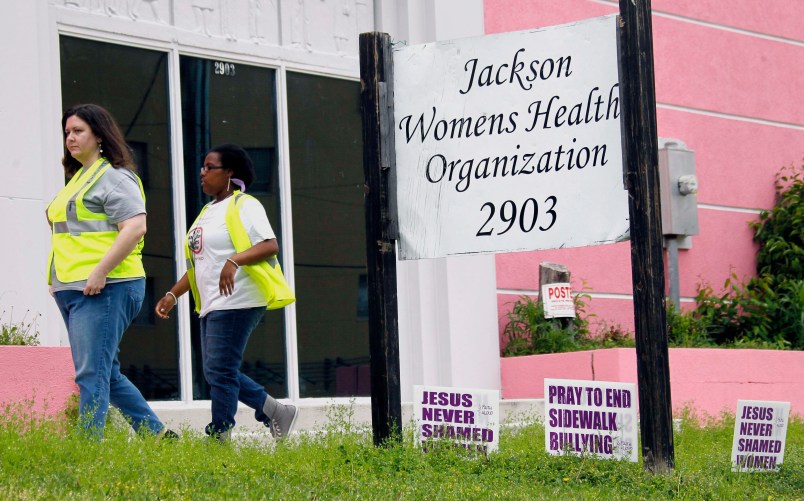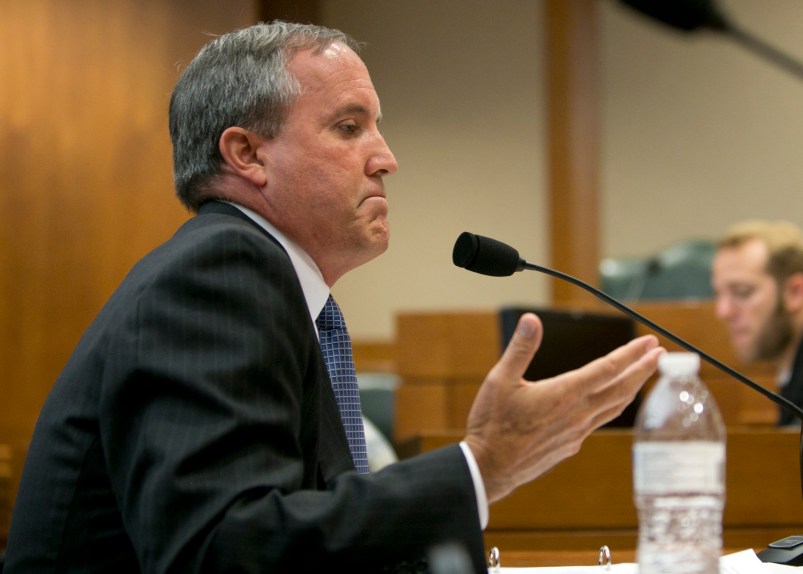Anti-choice politicians in the Mississippi House of Representatives recently passed a bill that would ban abortions in the state after 20 weeks. If the bill passes the state Senate, it is likely to be signed into law Gov. Phil Bryant (R), who has made no secret of his desire to ban abortion entirely in Mississippi. Like similar bills that have been passed around the country in recent years, the justification for this measure rests on the medically disproven theory of fetal pain.
The Mississippi bill is notable, however, in that the state has already created an environment where accessing abortion care at any stage of pregnancy is exceedingly difficult. Ninety-nine percent of all counties in the state lack an abortion provider; 91 percent of women in the state live in these counties. The remaining 9 percent live in the county where Jackson Women’s Health Organization, the state’s sole abortion clinic, is located. But the outcome of an appeal before a federal court could make Mississippi the only state in the country without any abortion clinics.
In 2012, the clinic sued the state over a law that required every OB/GYN at JWHO to have admitting privileges at a local hospital. While the law has taken effect, the state has not been allowed to impose penalties against the clinic. As of last summer, no area hospitals had granted admitting privileges to the doctors at the clinic; some hospitals had even refused to give the clinic applications.
This isn’t too surprising. All of the providers at JWHO live out-of-state, and hospitals are often reluctant to grant admitting privileges to doctors that do not live in their state. In addition, hospitals that are affiliated with certain religions won’t grant privileges to doctors that provide abortion care. It’s also likely that the hospitals in the Jackson area in particular are loath to grant the privileges either because of their own politics, or fear of attracting anti-choice protests. Indeed, seven of the hospitals that refused to give admitting privileges said that denials were because the physicians’ medical practice “is inconsistent with this Hospital’s policies and practices as concerns abortion and, in particular, elective abortions,” and admitting them “would lead to both an internal and external disruption of the Hospital’s function and business within this community.”
This requirement seems even more needless given that the clinic is currently able to send patients that need hospitalization to area hospitals for that care. Not that this is a common occurrence—abortion is an incredibly safe procedure, particularly when performed early in pregnancy. The vast majority of abortions in Mississippi, like in the rest of the country, are performed in the first trimester; and JWHO does not offer abortion care after 16 weeks.
All of this just serves to show how stigmatized every aspect of abortion care has become, even from a medical perspective. Too many medical schools avoid teaching about abortion for fear of causing controversy, and even residency programs often fail to adequately train doctors—even OB/GYNs—on these skills. It’s difficult to imagine specialists in any other field not knowing how to perform a common procedure, much less being afraid to openly provide that care. But the harassment, intimidation and threats of violence that providers and their clinic staff receive have had a chilling effect on training and provision.
“It’s a shame to have to provide medical care in a war zone,” June Ayers, the director of Reproductive Health Services in Montgomery, Alabama told me several years ago. She’s right. Medical professionals should be able to practice openly and without interference from protestors or politicians—especially when, as in Mississippi, that interference only causes harm.
If the state prevails in its lawsuit, and Jackson Women’s Health Organization has to close its doors, women in the state won’t suddenly stop needing abortion care. Rape and incest won’t cease to exist, and neither will severe fetal abnormalities or the risk of a pregnant woman developing serious complications herself. Women and men in the state won’t suddenly have access to comprehensive sex education and affordable contraception that can help delay pregnancy, or the paid maternity leave, quality daycare, and other social supports that help all parents have healthy families.
No, all that will change is that women will be denied access to legal medical care. That’s all. And that’s everything.
Sarah Erdreich is the author of Generation Roe: Inside the Future of the Pro-Choice Movement. She lives in Washington, D.C. with her family.
Correction: This story originally referred to a trial which would determine the outcome of the Mississippi clinic that would take place next week. The trial occurred last year and the decision is now pending appeal in higher courts.









